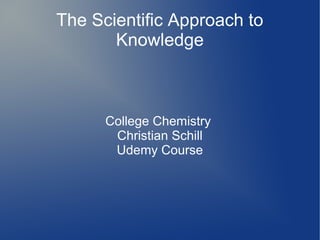Scientific Approach to Knowledge
•Download as ODP, PDF•
0 likes•372 views
Report
Share
Report
Share

Recommended
Recommended
More Related Content
Similar to Scientific Approach to Knowledge
Similar to Scientific Approach to Knowledge (20)
Journey to Discover The Secrets of Experimentation - Module on Experimentation

Journey to Discover The Secrets of Experimentation - Module on Experimentation
Recently uploaded
Recently uploaded (20)
Free and Effective: Making Flows Publicly Accessible, Yumi Ibrahimzade

Free and Effective: Making Flows Publicly Accessible, Yumi Ibrahimzade
SOQL 201 for Admins & Developers: Slice & Dice Your Org’s Data With Aggregate...

SOQL 201 for Admins & Developers: Slice & Dice Your Org’s Data With Aggregate...
Introduction to FDO and How It works Applications _ Richard at FIDO Alliance.pdf

Introduction to FDO and How It works Applications _ Richard at FIDO Alliance.pdf
Extensible Python: Robustness through Addition - PyCon 2024

Extensible Python: Robustness through Addition - PyCon 2024
AI presentation and introduction - Retrieval Augmented Generation RAG 101

AI presentation and introduction - Retrieval Augmented Generation RAG 101
The UX of Automation by AJ King, Senior UX Researcher, Ocado

The UX of Automation by AJ King, Senior UX Researcher, Ocado
PLAI - Acceleration Program for Generative A.I. Startups

PLAI - Acceleration Program for Generative A.I. Startups
Intro in Product Management - Коротко про професію продакт менеджера

Intro in Product Management - Коротко про професію продакт менеджера
Choosing the Right FDO Deployment Model for Your Application _ Geoffrey at In...

Choosing the Right FDO Deployment Model for Your Application _ Geoffrey at In...
The Value of Certifying Products for FDO _ Paul at FIDO Alliance.pdf

The Value of Certifying Products for FDO _ Paul at FIDO Alliance.pdf
10 Differences between Sales Cloud and CPQ, Blanka Doktorová

10 Differences between Sales Cloud and CPQ, Blanka Doktorová
Custom Approval Process: A New Perspective, Pavel Hrbacek & Anindya Halder

Custom Approval Process: A New Perspective, Pavel Hrbacek & Anindya Halder
Future Visions: Predictions to Guide and Time Tech Innovation, Peter Udo Diehl

Future Visions: Predictions to Guide and Time Tech Innovation, Peter Udo Diehl
Scientific Approach to Knowledge
- 1. The Scientific Approach to Knowledge College Chemistry Christian Schill Udemy Course
- 2. Science ● ● ● Science is empirical- meaning it is based on observation and experiment Scientists observe and perform experiments on the physical world to learn about it. Broken into many sub levels: – Biology – Chemistry – Physics – Astronomy
- 3. Observations There are two kinds of Observation ● Qualitative ● Quantitative – – ● Qualitative: describing how a process happens Quantitative: measuring or quantifying something about the process. These observations lead scientists to formulate a hypothesis (a tentative interpretation or explanation of the observations)
- 4. Experiments ● ● ● ● When a hypothesis is formulated it must be tested by an experiment. An experiment are highly controlled procedures designed to generate such observations. The results of the experiment may support one's hypothesis or disprove it. When a hypothesis is disproven it must be modified or changed and once again tested.
- 5. Scientific Law ● ● ● In some cases, a series of similar experiments can lead to the development of a scientific law. Scientific Laws are brief statements which summarizes past observations and predicts future ones. The Law of Conservation of Mass- “In a chemical reaction, mater is neither created nor destroyed.”
- 6. Theory ● ● ● One or more well- established hypotheses may form the basis of a Scientific theory. A theory is a model for the way nature is and tries to explain not merely what nature does but also why. Atomic Theory- Proposed by John Dalton, proposes that matter is made up of small, indestructible particles he called atoms
- 7. Theory ● ● ● One or more well- established hypotheses may form the basis of a Scientific theory. A theory is a model for the way nature is and tries to explain not merely what nature does but also why. Atomic Theory- Proposed by John Dalton, proposes that matter is made up of small, indestructible particles he called atoms